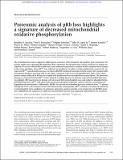Proteomic analysis of pRb loss highlights a signature of decreased mitochondrial oxidative phosphorylation
Author(s)
Nicolay, Brandon N.; Danielian, Paul S.; Kottakis, Filippos; Lapek, John D.; Sanidas, Ioannis; Miles, Wayne O.; Dehnad, Mantre; Gierut, Jessica J.; Manning, Amity L.; Morris, Robert; Haigis, Kevin; Bardeesy, Nabeel; Haas, Wilhelm; Dyson, Nicholas J.; Lees, Jacquelineb; Tschop, Katrin; Lees, Jacqueline; ... Show more Show less
DownloadNicolay-2015-Proteomic analysis o.pdf (1.651Mb)
PUBLISHER_CC
Publisher with Creative Commons License
Creative Commons Attribution
Terms of use
Metadata
Show full item recordAbstract
The retinoblastoma tumor suppressor (pRb) protein associates with chromatin and regulates gene expression. Numerous studies have identified Rb-dependent RNA signatures, but the proteomic effects of Rb loss are largely unexplored. We acutely ablated Rb in adult mice and conducted a quantitative analysis of RNA and proteomic changes in the colon and lungs, where Rb[superscript KO] was sufficient or insufficient to induce ectopic proliferation, respectively. As expected, Rb[superscript KO] caused similar increases in classic pRb/E2F-regulated transcripts in both tissues, but, unexpectedly, their protein products increased only in the colon, consistent with its increased proliferative index. Thus, these protein changes induced by Rb loss are coupled with proliferation but uncoupled from transcription. The proteomic changes in common between Rb[superscript KO] tissues showed a striking decrease in proteins with mitochondrial functions. Accordingly, RB1 inactivation in human cells decreased both mitochondrial mass and oxidative phosphorylation (OXPHOS) function. Rb[superscript KO] cells showed decreased mitochondrial respiratory capacity and the accumulation of hypopolarized mitochondria. Additionally, RB/Rb loss altered mitochondrial pyruvate oxidation from [superscript 13]C-glucose through the TCA cycle in mouse tissues and cultured cells. Consequently, Rb[superscript KO] cells have an enhanced sensitivity to mitochondrial stress conditions. In summary, proteomic analyses provide a new perspective on Rb/RB1 mutation, highlighting the importance of pRb for mitochondrial function and suggesting vulnerabilities for treatment.
Date issued
2015-09Department
Massachusetts Institute of Technology. Department of Biology; Koch Institute for Integrative Cancer Research at MITJournal
Genes & Development
Publisher
Cold Spring Harbor Laboratory Press
Citation
Nicolay, Brandon N., Paul S. Danielian, Filippos Kottakis, John D. Lapek, Ioannis Sanidas, Wayne O. Miles, Mantre Dehnad, et al. “Proteomic Analysis of pRb Loss Highlights a Signature of Decreased Mitochondrial Oxidative Phosphorylation.” Genes Dev. 29, no. 17 (August 27, 2015): 1875–1889.
Version: Final published version
ISSN
0890-9369
1549-5477